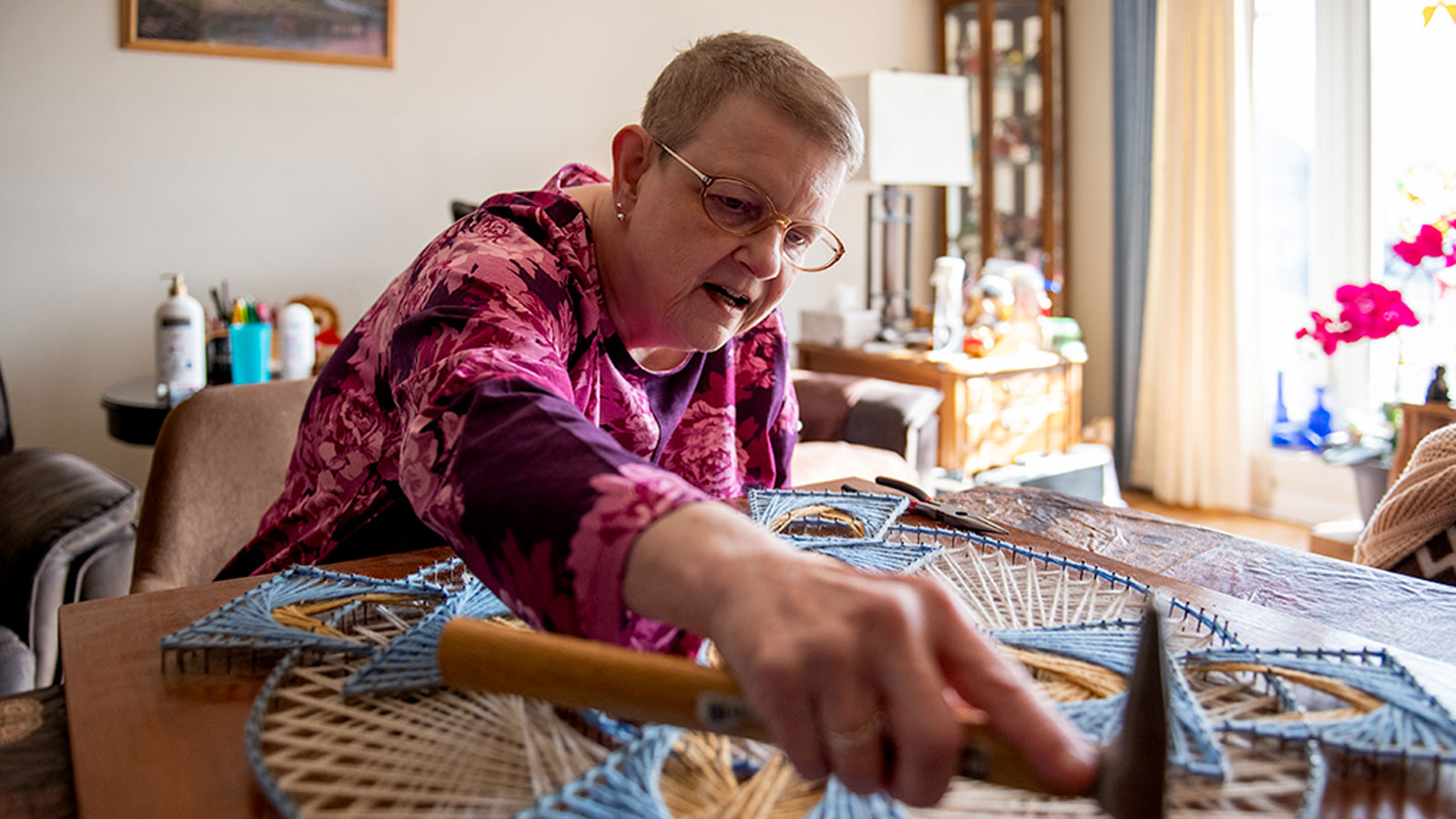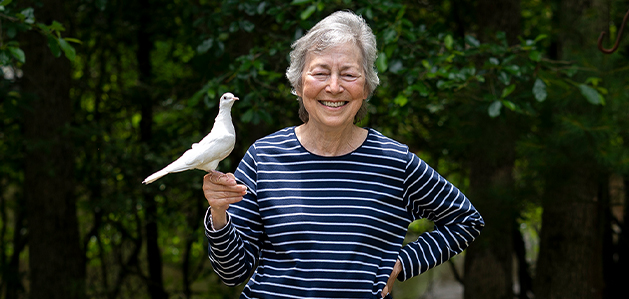Is Cancer Hereditary? What You Need to Know About Your Genetic Risks
Worried cancer runs in your family? Discover who should consider genetic counseling and testing, and what the results can mean for you.

By Gina Kovacs, GCA, Program Coordinator, Genetics, Penn Medicine | Virtua Health Cancer Program
When someone in your family is diagnosed with cancer, you may be afraid that you or other family members could be at risk. Certain cancers can be inherited. But this isn't usually the case.
All cancers are thought to stem from genetic mutations that develop over a person’s lifetime. These are different from inherited genetic alterations that can be passed down from parent to child.
Inherited alterations or mutations are present at birth and throughout an individual's lifetime. Inherited mutations can increase an individual's chance of developing certain types of cancer, but are thought to play a role in only a small number of all cancer diagnoses.
Who should have cancer genetic counseling and testing?
Some factors that may make you a good candidate for genetic counseling or testing are as follows:
- If you and/or multiple first-, second-, or third-degree family members (your parents, grandparents, aunts, uncles, cousins, siblings, or children) were diagnosed with certain cancers—especially breast, ovarian, colorectal, uterine, or pancreatic.
- If you or any close family member was diagnosed with cancer at a younger-than-expected age or with a rare cancer such as male breast cancer.
- If any close family member has already undergone genetic testing and is positive for a genetic mutation linked to a hereditary cancer syndrome.
- If you experience clinical features that indicate an increased risk of a hereditary cancer syndrome. For example, if multiple colon polyps are discovered during a colonoscopy.
Understanding genetic testing for hereditary cancer syndromes
Understanding hereditary cancer is a major focus of researchers around the globe, and as new findings emerge, the cancer genetics field grows.
The genetic testing environment has changed dramatically in just the last decade. Testing done five to 10 years ago may not be considered comprehensive based on current knowledge. Today, genetic testing labs can evaluate more than 50 genes related to hereditary cancer syndromes.
Virtua provides genetic counseling and testing for some of the best-understood hereditary cancer syndromes, including:
- Hereditary breast and ovarian cancer syndrome: BRCA1 and BRCA2 genes, which are linked to breast and ovarian cancer, as well as prostate and pancreatic cancers.
- Lynch syndrome: Also known as hereditary nonpolyposis colorectal cancer (MSH2, MLH1, MSH6, PMS2, and EPCAM genes), Lynch syndrome is linked to colorectal, endometrial, ovarian, pancreatic, stomach, and brain cancers, among others.
- Cowden syndrome: The PTEN gene, which is linked to breast, thyroid, and endometrial cancers, among others.
- Li-Fraumeni syndrome: The TP53 gene, which is linked to breast, blood, bone, and brain cancers, among others. We understand that a mutation of this gene is linked to many early-onset cancers, but it’s very rare.
What should you do if you test positive for hereditary cancer syndrome?
If a patient has genetic testing and tests positive for an alteration in one of these genes, the impact can be significant—for both the patient’s care and their family members.
If a woman is diagnosed with breast cancer, she might want to undergo genetic testing immediately so she can make decisions about surgical treatment. If it’s found that she has an alteration in one of the breast cancer genes, she might decide to have a bilateral mastectomy (surgical removal of both breasts) instead of a more conservative lumpectomy. This is because some of the high-risk breast cancer genes increase the risk of a second new breast cancer.
Genetic testing can also have important implications for future generations. For example, a patient who has three daughters recently tested positive for one of the BRCA genes. Now her daughters can have genetic counseling and testing to determine their breast and ovarian cancer risk. If they’re positive as well, they should start screening at age 25 with breast MRI.
Advanced tumor screening at Virtua
Lynch syndrome screening is a test used at Virtua on all colorectal or endometrial cancers. When a Virtua surgeon removes a colorectal or endometrial cancerous tumor, the tissue is tested for characteristics indicating an increased risk for Lynch syndrome. If the tumor has those features, it’s noted in the patient’s pathology report. This alerts the physician to refer them to Virtua’s cancer genetic testing and counseling program for genetic assessment and possible testing.
Virtua experts provide insights into your genetic cancer risks
To learn more about whether your personal or family medical history is concerning for hereditary cancer syndromes, call 856-247-7373 to schedule a telehealth cancer genetic counseling appointment.
There's So Much More to Explore
Discover expert insights, inspiring stories, health tips, and more by exploring the content below!

Weight-Loss Medications vs. Bariatric Surgery: What's Right for You?

Can Your Gut Health Affect Your Heart?

Understanding Food Addiction: Causes, Symptoms, and Recovery Strategies

10 Reasons to Schedule Your Colonoscopy Screening Today

At-Home Colon Cancer Tests vs. Colonoscopy: Which Screening Option Is Right for You?

10 Hand Washing Tips to Keep You Healthy All Year

8 Signs It's Time to See a Gastroenterologist

How the Unique Stages of a Woman's Heart Affect Her Health

Cervical Cancer Screening Guidelines: What You Need to Know

HeartTalk Magazine

How to Spot the Early Signs and Symptoms of a Stroke

How Weight-Loss Surgery Can Improve Diabetes, Heart Health, and More

6 Tips for an Easier Colonoscopy Prep

How to Achieve Your Health Goals This Year

Knee Replacement Rehab: 7 Exercises to Restore Your Strength and Range of Motion

COPD vs. Asthma: Understanding the Difference in Symptoms

Caregiving During the Holidays: Ways to Manage Stress and Find Joy

Bioidentical Hormone Replacement Therapy Pellets: Relief for Menopause and Andropause Symptoms

Why Is Sex Painful During Pregnancy? Pelvic Congestion Syndrome Explained

COVID-19 Vaccines and Pregnancy: FAQs

Don't Drink Alcohol? You Could Still Get Fatty Liver Disease

What Is the Difference Between Palliative Care and Hospice Care?

How to Exercise Safely with Asthma: Tips, Triggers, and Rescue Inhaler Use

How to Relieve Bloating Fast: Simple Tips for Quick Comfort

COMFORTing Tips to Avoid Holiday Heartburn

How to Tell the Difference Between Cold, Flu, and COVID-19

Jill Travels From Delaware to South Jersey for Advanced Lung Care

4 Exercise Tips to Help You Reverse High Blood Pressure

From Exhaustion to Empowerment: Tracy's Hormone Replacement Therapy Success Story

Why on Earth Am I Always So Cold?

Daily Wellness Checklist: Simple Habits for Feeling Good Inside and Out

Timely Heart Care During a Heart Attack Helps Joe Feed the Community

Allegra Is Thriving With Crohn's Disease

The Best and Worst Foods for Acid Reflux

How to Manage IBS Symptoms and Feel in Control Again

5 Types of Lung Disease: Symptoms, Causes, and Prevention Tips

Foods to Enjoy and Avoid for GLP-1 Heartburn

3 Reasons Why Now's the Time to Find Relief From Varicose Veins

Baseball Coach Turns Male Breast Cancer Surprise into Personal Mission

The Brain Health Checklist: 11 Questions Everyone Should Ask

From Caregiver to Patient: Robotic Surgery Relieves Teresa's Knee Pain

How to Get and Stay Healthy This Fall

How to Reverse Prediabetes and Prevent Type 2 Diabetes

6 Ways to Get More Out of Your Daily Walk

Young Breast-Cancer Survivor Has New Hope for Healthy Future

Is Cancer Hereditary? What You Need to Know About Your Genetic Risks

Tara's Story: From Debilitating Uterine Fibroid Pain to a Half-Marathon Medal

Is Your Post-Pregnancy Belly Bulge a Sign of Diastasis Recti?

Your Guide to Mammograms: When to Get Screened and What to Know

The Top 10 Foods That Boost Your Brain Health

Is It Safe to Exercise During Pregnancy?

Prevent Yard Work Injuries: Tips for Mowing, Gardening, and Raking

How to Curb Nighttime Snack Cravings

Is Your Daily Walk Making You Really Sore?

IBS and Alcohol: Can You Still Enjoy a Drink?

Focus on Mental Health Is Key Part of Andrew's Weight-Loss Journey

What You Need to Know About Epilepsy

'Feeling Joy Again': ECT Brain Stimulation Therapy Restores Ashley's Well-Being

Not Just for Wrinkles: Botox Injections Promote Improved Bladder Control

Easy, Healthy Lunch Ideas for the Beach

How to Stay Cool and Prevent Heat Illness All Summer Long

Do Not Get Burned by These Sunscreen Myths

Beat the Bugs and Save Your Summer

What Happens to Your Body When You Don't Get Enough Sleep?

How to Have a Healthy Pregnancy if You're Overweight

Why You Get Sick on Vacation (and How to Stay Healthy While Traveling)

6 Hot Tips for a Safer Summer

4 Surprising Health Truths You Should Know

5 Interesting Facts About Your Heart

Is Low Sex Drive Normal? Revealing the Complex Causes of Low Libido in Women

5 Feel-Good Activities to Explore Around South Jersey

Stress Incontinence vs. Urge Incontinence: What's the Difference?

5 Key Facts About Proton Therapy for Cancer Treatment

3 Changes You Can Make Today to Lower Your Cancer Risk

A Lung Cancer Screening Could Save Your Life

Mood Swings vs. Mood Disorders: Know the Signs and Get Help
Are emotional ups and downs disrupting daily life? Learn common signs of mood disorders, and when to talk to a doctor about diagnosis and treatment options.

Take Pride in our Health: Must Dos for LGBTQ+ Preventative Care

4 Foolproof Pelvic Floor Strengthening Exercises for Women

What to Expect During Perimenopause

Protect Yourself From Tick Bites and Lyme Disease

10 Quick Ways to De-Stress

4 Ways to Stay Fit and Healthy on a Budget

6 Tips to Tame Your Spring Allergies

Do You Know the Signs and Symptoms of Uterine Fibroids?

How Are Uterine Fibroids Treated?

From Restless to Restful: How Movement Improves Sleep

5 Simple Ways to Spring Clean Your Wellness Routine

How Do You Manage the Side Effects of Weight-Loss Medications?

A Woman’s Four-Step Guide to Fight Back on Back Pain

What You Need To Know About Carpal Tunnel Syndrome

The Truth About Menopause, Weight Gain, and Belly Fat

Shedding Light on Lesser-Known Menopause Symptoms and Solutions

Debunking The Myths About Vaginal Dryness
Inside Look at Blood Vessels Aids PAD Treatment
Denise Davis: Pay Attention to Your Heart Health

What You Need To Know About Stroke Treatment

Best Foods for Kidney Health

10 Smart Ways to Manage Your Diabetes

Signs You May Have Chronic Kidney Disease

5 Essential Winter Foot Care Tips When You Have Diabetes

Sweet Music: Trust, Teamwork Save Justin from Heart Attack

Complex Heart Surgery Nets James a Lifelong Friend

Your 10-Point Plan to Avoid Winter Weight Gain

Hepatitis C Kidney Transplant a Blessing For Lee Manns

7 Reasons Why You Want Your Surgeon to Be an Expert in Robotics

Colitis Symptoms Under Control, Jennifer Is ‘Living My Best Life’

How Do I Care for a Wound that Won't Heal?

Surprising Symptoms May Signal Stroke In Women

8 Key Steps to Better Blood Pressure Control

Five Back Pain Risk Factors That You Should Know

Is My Back Pain Normal, or Is It Spinal Stenosis?

Augmented-Reality Surgery Has Bobby Back on Stage, Rocking His New Hip

Robotic Hernia Surgery Combines Innovative Techniques With Faster Recovery Times

5 Back Stretches for the Work-From-Home Workweek

The HPV Vaccine: A Powerful Shield Against Cervical Cancer

How Does Breast Density Affect Your Mammogram?

Menopause: New Insights Into the Power of Hormone Replacement Therapy

How to Prevent and Treat Urinary Tract Infections

Signs You Should Get Treated For Vein Problems

One New Heart Valve Saves Two Lives in the Tritten Family

What You Need to Know About Heart Failure

6 Numbers Key to Keeping Your Heart Healthy
Lung Valve Surgery Relieves COPD, Emphysema Symptoms

4 Easy Ways to Treat and Prevent Runner's Knee

Lung Screening, Robotic Technologies Get Pat Kicking Up Her Boots Again

Breast Cancer Diagnosis Inspires Catherine to Help Others

Jasmine’s On-Air and Pain-Free After Gallbladder Surgery

When Should I See a Doctor About My Knee Pain?

Quick Action Leads to Jesse's Recovery From Stroke

A Non-Athlete’s Guide to Shoulder Overuse Injuries
Shoulder problems aren’t limited to athletes. Virtua orthopedic surgeon Sean McMillan, DO, explains shoulder overuse injuries and prevention in this article.

Put Lower Back Pain Behind You With This Ten-Step Guide

Wide-Awake Hand Surgery Speeds Recovery, Puts Control in Patients' Hands

South Jersey Veteran Thrives After Cross-Country Kidney Donation

Five Mindfulness Tips That Can Help Heal Your Heart
Working from Home? Take a Quick Break to Stretch Your Wrists

3 Ways to Avoid Knee Pain

When Should I See a Doctor for My Hip Pain?

When Should I See a Doctor About My Shoulder Pain?

Is My Back Pain Normal, or Is It Sciatica?

Is My Back Pain Normal, or Is It a Herniated Disk?

When Is It Back Pain, and When Is It Something More?

Watchman Heart Device: a Technological Breakthrough for Blood Clot Prevention

Albert's Emergency Cardiac Surgery Is a 'Story of a Lifetime'

What Can I Do Right Now About My Aching Back?

How Do I Get Rid of This Back Pain for Good?

Love Your Heart: Essential Care Tips for Every Stage of Life

How Do I Measure My Blood Pressure at Home?

How Do I Improve My Cholesterol Levels?

3 Ways to Reduce Your Stroke Risk

When Should I Be Worried About My Neck Pain?
Advanced Heart Failure Therapies Get Bernadine Back to Full Speed

Sarah Wins Back Her Health After Crohn's Disease Diagnosis

Overcoming Addiction, Philip Now Sees More Positive Side to Life
Firefighter's Successful Lung Cancer Care at Virtua
A Lung Screening Put Teresa Back in the Race

A Breast Self-Exam Saved Kristen's Life

How Sex Keeps You Healthy as You Age

Protect Your Child From HPV and Related Cancers

Why IUDs Might Be The Most Effective Birth Control

5 Things You're Too Embarrassed to Tell Your OBGYN

4 Not-So-Crazy Questions to Ask Your Doctor

Early Treatment is Best to Relieve Hemorrhoid Symptoms

The Top 10 Foods For A Healthy Diabetes Diet

Keeping the Beat: Advanced Heart Surgery for Aortic Aneurysm

Are You At Risk For Chronic Kidney Disease

Rectal Cancer Surgery Gets Eileen Back to her Magical Life | Virtua Health
Robotic Surgery Helps Shelly Haney Return to Her Happy Place

New Technology Precisely Marks Suspicious Breast Lumps Before Biopsy to Ease Patient Anxiety

Local Pastor Makes Kidney Health Mission of Ministry
Master 3 Mens Health Issues
Personalized Breast Cancer Treatment Puts Choice In Womens Hands
Radiosurgery Delivers Targeted Treatment for Brain Tumors
Seeing a Social Worker at the Hospital
Start Reducing Your Cancer Risk Today

What’s the Difference Between Type 1 and Type 2 Diabetes?
Call Your OBGYN if You're Bleeding After Menopause
Know Your Endometrial Cancer Treatment Options
Robot Helps Spot Lung Cancer Early
6 Healthy Habits to Start in Your 20s for Better Lifelong Health
Restoring Appearance and Spirit After Breast Cancer
4 Essential Cancer Screenings
How to Overcome Colonoscopy Fears
What You Need To Know About Cancer And COVID 19 Risks
Prostate Cancer Screening: What You Need to Know
Military Veteran Pam Carpino Offers Hope to Women With Triple Negative Breast Cancer
Reclaim Your Strength and Spirit After Breast Cancer
The Cardio Oncology Team Protects Your Heart During Cancer Treatment
Coping with Body Changes After Breast Cancer Treatment
How Doctors Determination and Dancing Helped Judy Stokes Through Breast Cancer Treatment
How Is Breast Cancer Diagnosed?

All for Bear: Dan Loses Weight to Be His Son’s Kidney Donor

Hyperbaric Wound Therapy Puts Joette Back in Motion

Robotic Hernia Repair Renews David's Active Lifestyle

